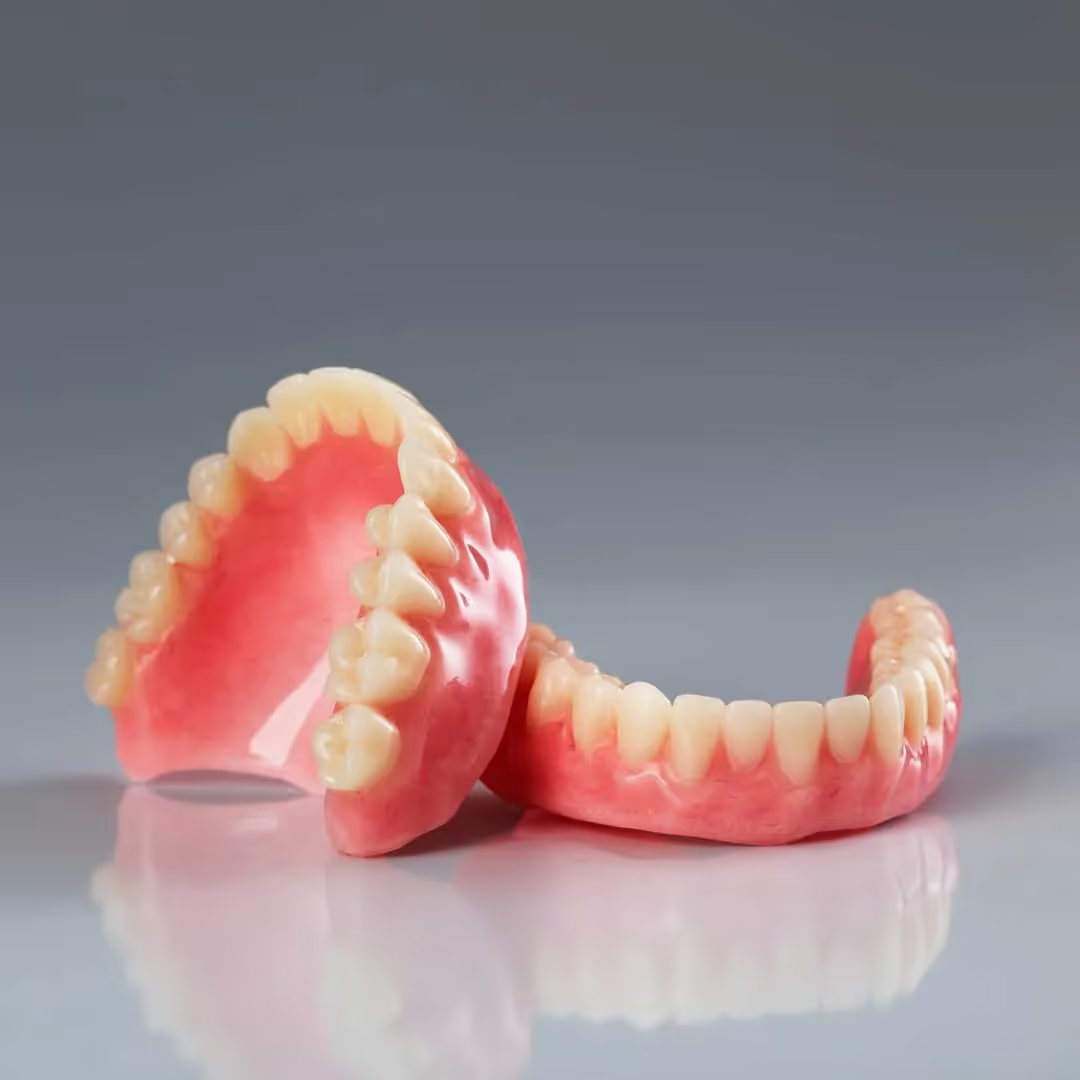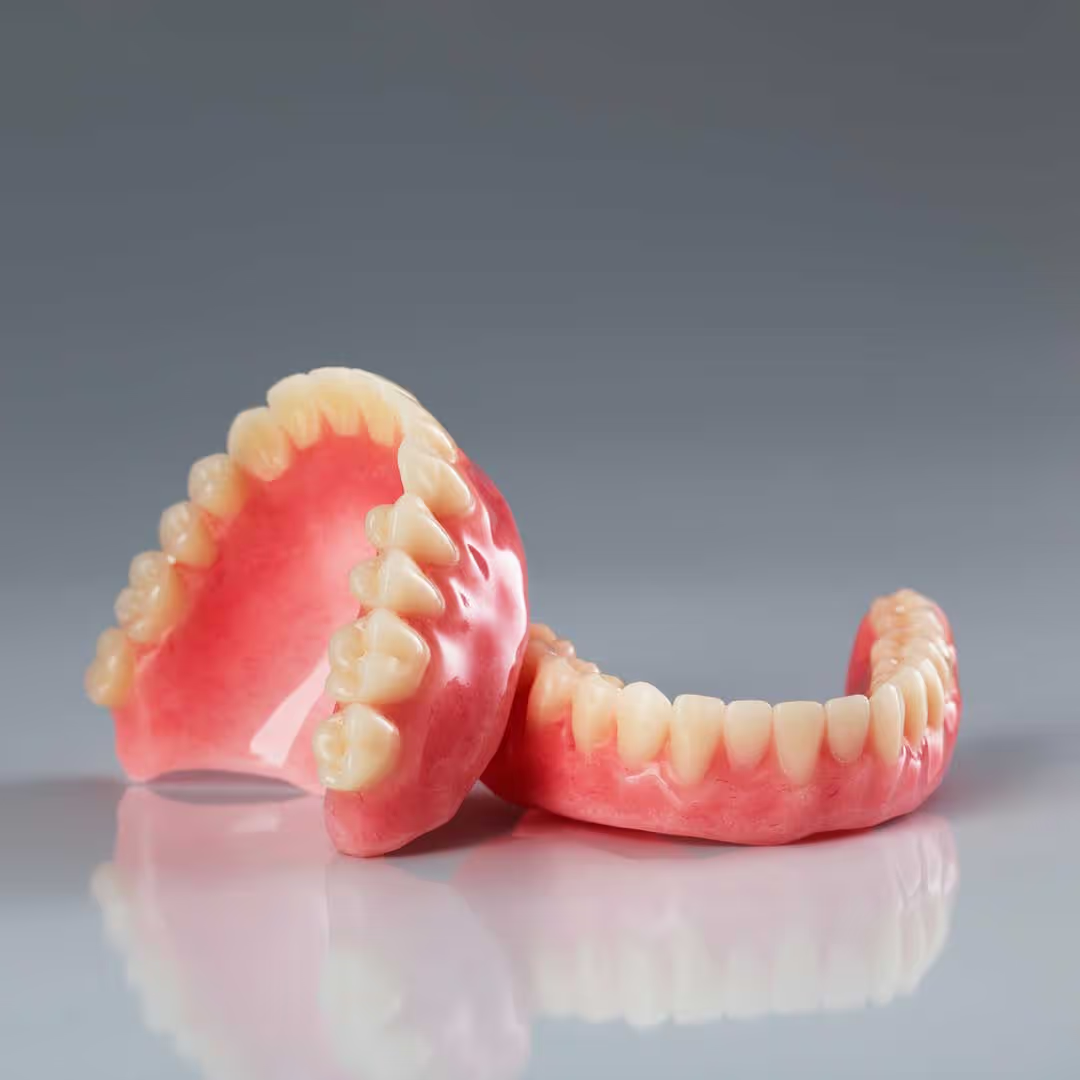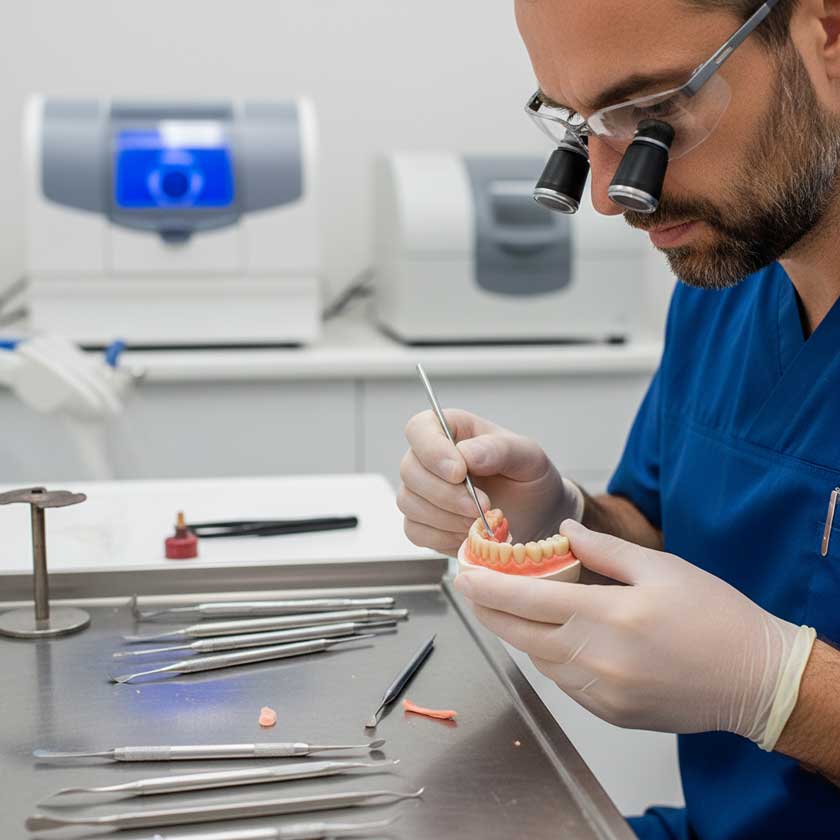Dentures are an essential aspect of maintaining your oral health and overall well-being. However, their condition can gradually deteriorate over time, leading to discomfort, aesthetic concerns, and other problems. Hence, it's crucial to know when your dentures require attention to ensure optimal functionality and comfort.
Using denture adhesive can provide a temporary solution for poorly fitting dentures, helping to stabilize them and prevent issues like discomfort and bad breath. However, it is important not to over-rely on denture adhesive, as it can mask underlying fit problems that require professional attention.
In this section, we will highlight the common signs of denture damage, discuss common denture problems, and provide expert tips on essential denture maintenance and cleaning techniques. We will also provide insights into when to seek denture repair or replacement and the importance of a regular denture evaluation by an expert.
Key Takeaways
- Regular denture maintenance and cleaning are essential to maintain optimal oral health.
- Properly fitting dentures are crucial to prevent discomfort and other health concerns.
- Recognizing the signs of damage, discomfort, and maintenance needs can help you take appropriate measures in time.
- Expert evaluation and regular check-ups can prevent potential issues and ensure your overall well-being.
- Knowing when to seek denture repair or replacement is essential for maintaining their longevity and functionality.

Recognizing signs of denture damage.
Dentures are designed to provide a comfortable fit and restore optimal oral function. Over time, however, they may develop signs of damage or wear that require attention to maintain their condition. Here are some of the common signs of denture damage you should be aware of:
Broken or cracked dentures.
Accidents or mishandling can cause dentures to break or crack. It may be tempting to ignore minor damages, but even small cracks can worsen over time, leading to discomfort or oral health issues. If you notice signs of damage, seek denture repair as soon as possible to avoid further complications.
Detached denture teeth.
Loose or broken denture teeth can cause discomfort, affect your eating habits, and damage your oral tissues. Immediate denture repair can fix the problem and prevent more significant issues.
Denture chips or cracks.
Small chips or cracks in dentures can cause discomfort or be a visual distraction. Although they may not necessarily harm your oral tissues, fixing them can improve your comfort and confidence in your appearance.
Damaged dentures
Worn, ill-fitting, or damaged dentures can cause discomfort, pain, jaw misalignment, and poor oral function. Repair or replacement may be necessary to restore your comfort, oral health, and overall well-being. Having dentures relined can reshape the interior for better contact with the gums, and periodic relining is often necessary to maintain comfort and function.
If you notice any signs of denture damage, seek prompt assistance from a dental professional to determine if repair or replacement is necessary. Neglecting these issues can worsen over time and lead to more pain and expense in the long run.
Identifying denture discomfort.
Wearing dentures should not cause discomfort. However, sometimes, you may notice some signs that indicate ill-fitting or uncomfortable dentures that require attention. Denture wearers often face challenges related to ill-fitting dentures, which can affect both comfort and oral health. It is crucial to maintain open communication with oral health providers, especially during the initial adjustment period, to ensure proper fitting and management of discomfort. Here are some signs to look out for.
Loose dentures
If your dentures feel loose, it could be because your gum tissue has changed or shrunk over time. As a result, your dentures won't fit as well as they used to, causing discomfort and slippage.
Sore spots and ulcers.
Ill-fitting dentures can cause sore spots, which are red, painful areas on your gums. Prolonged pressure on these sore spots can cause ulcers, making it difficult to eat or talk.
Slippage and chewing difficulty.
Loose dentures can slip out of position, making it hard to chew. Often, patients with denture slippage may chew on one side, leading to joint pain or headaches.
Uncomfortable dentures.
Your dentures should feel comfortable and not cause any pain or discomfort. If you feel constant discomfort or pressure, it is an indication that you need a denture adjustment or a reline to improve the fit.
If you experience any of these symptoms, it’s crucial to seek professional assistance. Ensuring that your dentures fit properly is essential for comfort and oral health. At regular appointments, your dentist will assess the denture fit, check for any sore spots, and address any adjustments or repairs required to keep you comfortable.
Maintaining denture aesthetics.
Aside from ensuring proper functionality and comfort, your dentures also contribute to your facial appearance. While dentures are designed to mimic the appearance of natural teeth, they cannot fully replicate the unique dynamics and structural support provided by actual teeth. It is important to be aware of the signs of denture-related aesthetic issues to address any concerns regarding your denture appearance.
One common issue is a collapsed appearance, which can cause sunken cheeks and premature wrinkles. Sagging skin is another indication that your dentures require attention.
To maintain optimal denture aesthetics, it is essential to practice good denture hygiene and care. Regular cleaning, removal of denture stains, and thorough inspection can prevent future damage and prolong the lifespan of your dentures. Be sure to consult with a professional if you notice any changes in your denture's appearance or experience discomfort with their fit.
The importance of regular denture maintenance for oral health.
Proper denture maintenance is essential to ensure the longevity of your dentures and maintain your oral health. Regular examinations, assessments, and cleaning techniques are crucial to keep your dentures in top condition. Neglecting proper maintenance can lead to issues like stains and porous spots that may require professional attention.
Regular denture examination and assessment.
Regular examination and assessment of your dentures by a dental expert can help detect any potential issues early on. During the examination, the dentures will be assessed for fit, stability, and signs of damage. Any concerns will be addressed promptly, helping to prevent any more significant issues.
Denture cleaning techniques.
Regular cleaning of your dentures is essential to prevent any build-up of stains and bacteria that can lead to oral health issues. Brush your dentures daily with a soft-bristled brush and non-abrasive denture cleanser. Avoid using regular toothpaste, as it can be too abrasive and damage dentures. Additionally, soaking your dentures regularly in a special cleaning solution can help to remove any residue and leave them looking and feeling clean.
Special attention to denture stains and porous spots.
Dentures are prone to developing stains and porous spots due to regular use. These occur due to the accumulation of bacteria, food, and fluids. It is essential to seek professional attention to address these issues properly. Denture cleaning solutions can remove some stains, but others may require professional polishing or replacement.
Regular maintenance of your dentures is crucial for optimal oral health and longevity. By incorporating regular examinations, cleaning techniques, and professional attention to stains and porous spots, you can keep your dentures in top shape for years to come.
Understanding the impact on facial profile.
Your dentures play a significant role in your facial profile and appearance. When ill-fitting or damaged, they can cause sunken cheeks and a collapsed facial profile.
Wearing dentures that do not fit well can result in bone resorption, causing your cheeks to sink and your facial structure to change. This can lead to a collapsed appearance, which often leaves individuals looking older than their actual age.
If you're experiencing any of these signs, it's essential to seek professional assistance to address the issue. Your denturist can help ensure your dentures fit appropriately, correcting any issues that may affect your facial profile and overall oral health.
Don't ignore the signs. Seek professional help and restore your smile and facial profile today.
Knowing when to replace dentures.
Dentures play a crucial role in your oral health and overall well-being. With proper care and maintenance, dentures can last for years. However, there comes a time when replacement becomes necessary. Not sure if it’s time to replace your dentures? Here are some signs to watch out for:
- Your dentures are more than 5-7 years old
- You experience frequent gum irritation or soreness
- Your dentures no longer fit properly
- You have difficulty speaking or eating
- Your dentures are visibly damaged or worn
- You experience persistent bad breath
If dentures no longer fit properly or have deteriorated, it may be necessary to replace them with new dentures to avoid health complications and improve overall fit.
If you experience any of these signs, it may be time to consider denture replacement. Our experts can guide you through the replacement process and help you determine the best type of dentures for your needs. Don’t suffer through discomfort or functional issues; schedule a consultation today to ensure optimal functionality and comfort.
Tips for denture care and cleaning.
Proper denture care and cleaning are crucial for maintaining optimal oral health. Neglecting your dentures can lead to a variety of issues, such as dental infections, bad breath, and discomfort. Here are some expert tips on how to effectively clean and care for your dentures at home:
1. Rinse your dentures after eating.
After every meal, remove and rinse your dentures under running water to remove any food particles. This prevents stains, odors, and bacteria from building up on your dentures.
2. Clean your dentures daily.
Use a soft-bristled brush and a non-abrasive denture cleaner to clean your dentures every day. Avoid using regular toothpaste, as it can be too harsh and cause damage to your dentures. Be sure to clean all surfaces of your dentures thoroughly, including the gums and tongue.
3. Soak your dentures overnight.
Soaking your dentures overnight helps to remove any stubborn stains or bacteria that may have accumulated throughout the day. Use a denture soaking solution that is approved by your dentist, and be sure to rinse your dentures before wearing them in the morning.
4. Handle your dentures with care and use denture adhesive.
When you're not wearing your dentures, be sure to handle them with care. Avoid dropping them or bending them, as they can break or become damaged easily. Store your dentures in a safe, dry place, and keep them out of reach of children and pets.
5. Schedule regular dental check-ups.
Regular dental check-ups are crucial for maintaining the health of your dentures and your overall oral health. Your dentist can examine your dentures for signs of damage or wear, as well as provide professional cleaning and adjustment services. Regular dental check-ups are especially important for individuals who wear dentures to ensure proper fitting and address any gum health issues that could affect denture wear.
By following these denture cleaning tips and care guidelines, you can maintain the lifespan of your dentures and keep your oral health in optimal condition.
Seeking denture repair or adjustment.
If you experience any discomfort or notice damage to your dentures, it’s essential to seek professional assistance promptly. Changes in gum and bone structure can affect the fit and stability of partial dentures, and professional adjustments can help address these issues. Denture adjustment, realignment, or refitting may be necessary to ensure a comfortable fit and optimal oral health.
Signs that your dentures may require adjustment include sore spots, slippage, difficulty chewing, or developing ulcers. These issues can worsen or become painful if left untreated, making prompt evaluation vital for effective treatment.
If your dentures have not been evaluated recently, schedule an appointment with your dentist or denturist. They can assess the fit and function of your dentures and determine whether any adjustments, repairs, or replacements are necessary.
Regular denture check-ups are essential for prolonging the lifespan of your dentures, improving your oral health, and preventing any future problems.
The importance of expert denture evaluation.
Regular check-ups with a denture expert are crucial in identifying and addressing potential issues with your dentures. As with any medical device, problems can arise, and it's essential to catch them early on to prevent more significant concerns.
Persistent inflammation and irritation caused by ill-fitting dentures can lead to serious health issues, including an increased risk of oral cancer. Therefore, regular evaluations are vital to ensure your dentures fit properly and do not cause harmful effects.
Expert denture examinations and assessments will help ensure that your dentures are functioning optimally and have no underlying damage that could compromise your oral health. During these evaluations, a professional will thoroughly examine your dentures' condition, ensuring that they fit comfortably and securely and making any necessary adjustments or repairs.
Scheduling regular denture evaluations is a smart way to catch any potential issues and address them before they become significant concerns. By staying on top of your denture care, you can have peace of mind knowing that your oral health and overall well-being are well taken care of.
Why you should consider regular denture evaluations.
- Identify potential problems early on
- Ensure optimal functionality and fit
- Prevent oral health issues
- Address any discomfort or pain
- Prolong the lifespan of your dentures
If you haven't had your dentures examined by a professional in a while, it may be time to schedule an appointment. A denture expert will examine your dentures to identify any potential problems and offer professional solutions to optimize your oral health.
Don't wait until you're experiencing discomfort or pain to seek expert denture evaluation. By keeping up with regular evaluations, you can stay ahead of any potential issues and maintain optimal oral health.
Regular maintenance and proper denture.
Keeping your dentures in good condition is crucial for ensuring optimal oral health and overall well-being. By recognizing the signs of damage, discomfort, and maintenance needs, you can take appropriate action and seek professional assistance when necessary. Remember to follow proper denture care and cleaning techniques, schedule regular evaluations by a denture expert, and know when it's time to consider replacement. Taking these steps will help you maintain a comfortable fit, prevent issues, and prolong the lifespan of your dentures.
FAQ
How can I tell if my dentures need attention?
Several signs indicate your dentures require attention. Some common problems with dentures are cracks, chips, loose teeth, discomfort, difficulty chewing, and changes in facial appearance. If you experience any of these issues, seeking dental assistance for denture repair, adjustment, or replacement is important.
What are some common signs of denture damage?
Common signs of denture damage include cracked or broken dentures, chips in the denture material, and detached denture teeth. If you notice any of these issues, it's crucial to visit your dentist or denturist for prompt repair or replacement.
How can I identify denture discomfort?
Denture discomfort can manifest in various ways. Some common signs include ill-fitting or uncomfortable dentures, loose dentures that move or slip while eating or speaking, sore spots or ulcers on your gums, and difficulty chewing. Ill-fitting dentures can create gaps that allow food and bacteria to enter, leading to oral infections and gum irritation. If you experience any of these symptoms, it’s important to have your dentures evaluated by a dental professional.
Are dentures important for maintaining facial aesthetics?
Yes, dentures play a significant role in maintaining facial aesthetics. Ill-fitting or damaged dentures can lead to a collapsed appearance, sunken cheeks, premature wrinkles, and sagging skin. If you notice changes in your facial profile, it's essential to seek denture adjustments or replacement to restore your natural contours.
Why is regular denture maintenance important?
Regular denture maintenance is crucial for preserving their condition and preventing issues. It involves routine examinations and assessments by dental professionals, proper cleaning techniques at home, and prompt attention to denture stains or porous spots. Following these maintenance practices will help extend the lifespan of your dentures and ensure optimal oral health.
Can dentures affect my facial profile?
Yes, ill-fitting or damaged dentures can affect your facial profile. Sunken cheeks and a collapsed appearance are common signs that your dentures may need adjustment or replacement. Seeking professional help can restore your facial aesthetics and prevent further complications.
When should I consider replacing my dentures?
Dentures have a lifespan, and there are several factors to consider when determining if replacement is necessary. These include significant wear and tear, changes in your oral health, discomfort or ill fit, and changes in your facial profile. It's important to consult with your dentist or denturist to determine the best course of action.
What are some tips for denture care and cleaning?
For proper denture care, it's recommended to remove and rinse your dentures after meals, brush them daily with a soft brush and non-abrasive cleaner, soak them overnight in a denture solution, and rinse thoroughly before wearing. Avoid using hot water or abrasive cleaners and handle your dentures with care to prevent damage.
When should I seek denture repair or adjustment?
If you notice any signs of damage or discomfort with your dentures, such as cracks, chips, loose or ill-fitting dentures, or difficulty chewing, it's important to seek professional assistance. Denture repair or adjustment services can help restore the fit and function of your dentures, improving your comfort and oral health.
Why is expert denture evaluation important?
Regular evaluations by a denture expert are essential for identifying any potential issues with your dentures. Only properly fitted dentures can provide the necessary stability and comfort for wearers, and regular evaluations help ensure this. Expert examination and assessment can detect problems early on, such as cracks, wear and tear, and ill fit, allowing for prompt repair or replacement before more significant concerns arise.








